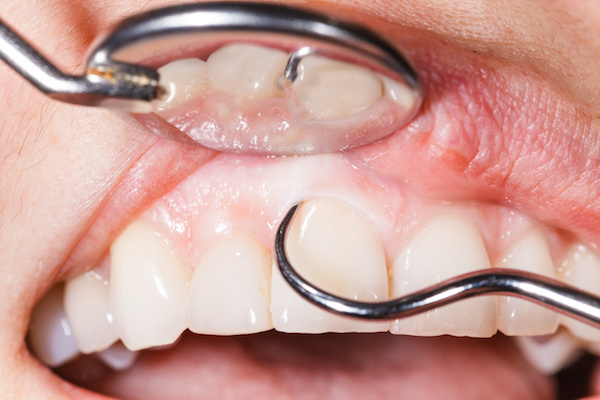
What Causes Gum Disease?
Gum disease includes everything from mild inflammation that causes red and swollen gums to severe periodontal disease that puts you at risk of tooth loss. The ultimate cause of gum disease is poor dental hygiene. Gum disease begins when bacterial plaque, the film that forms when bacteria interacts with food particles on your teeth, isn’t removed from the surface of your teeth. Although everyone develops bacterial plaque, it becomes a major problem when it stays on your teeth for long periods of time.
Brushing and flossing remove plaque, so forgetting to brush or floss contributes to the development of gum disease. There are a few specific factors that can make you more likely to develop gum disease, but anyone who doesn’t take care of their teeth can end up with excess plaque.
Regular brushing and flossing along with regular dental cleanings helps prevent gum disease and treat the earliest stages. Once gum disease reaches a certain point, professional dental care is needed to halt or repair the damage.
The Progression of Gum Disease
Gum disease starts when food particles, mucus and naturally occurring bacteria in your mouth form a sticky substance called plaque. If this plaque isn’t brushed away, it turns into tartar, a hard substance that irritates your gums. Gingivitis, which occurs when the gums swell up from inflammation, is the first stage of gum disease. Bleeding gums are common at this stage of gum disease, and many people notice bleeding during tooth brushing as a first symptom of gingivitis. At this point, there’s no permanent damage to your teeth or gums. Removing the plaque and tartar can reverse the progression of gum disease at this point.
Plaque is removable through simple brushing and flossing, but tartar requires a professional cleaning below the gum line. To get rid of tartar and prevent future buildup, your dentist has to perform a scaling and root planing. During scaling, the dentist or dental hygienist uses a tool to scrape off all the tartar. Root planing smooths out rough spots on your tooth that collect plaque and lead to tartar buildup.
If gingivitis isn’t treated and tartar isn’t removed, periodontitis can develop. In this stage of gum disease, pockets form between the gums and teeth as the gums pull away from the tooth surface. Infections develop in these pockets and the bacteria starts to break down the connective tissue and bone holding the tooth in place. The teeth may become sensitive and the gums may feel tender. Chewing might become painful. Left untreated, periodontitis leads to loose teeth or complete tooth loss.
Risk Factors for Gum Disease
Some people are more prone to gum disease than others. Men tend to get gum disease more often than women, and some people have a genetic susceptibility to developing gingivitis and periodontitis. If you have a family history of gum disease, you might have a genetic propensity for it as well.
When it comes to habits that affect your risk, smoking is a major factor. Smokers develop gum disease twice as often as nonsmokers do, according to the U. S. Centers for Disease Control and Prevention. Plus, treatment for gingivitis and periodontal disease is typically more successful in nonsmokers. Using smokeless tobacco also raises your risk of developing gum disease.
People with certain diseases, including diabetes and HIV, have a higher risk of developing gum disease. Medications that reduce saliva production can also increase the risk because saliva helps wash away food particles on your teeth. The hormonal changes that occur during pregnancy may also make a woman more susceptible to gum disease.
Misaligned teeth can be another contributing factor to gum disease. Because it’s harder to clean between teeth that aren’t properly aligned, plaque has plenty of hard-to-access places where it can build up. Braces and bridgework can also hamper your cleaning efforts and provide hidden areas for plaque to form, making careful attention to cleaning a must.
Gum disease is preventable, and it’s also treatable, especially in the earliest stages. Schedule regular cleanings with your dentist at Vero VIP Implants and Periodontics to keep your gums and teeth in top condition.